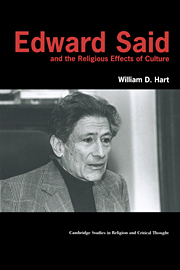Book contents
- Frontmatter
- Contents
- Preface
- Abbreviations
- Preliminary remarks
- 1 Culture as the transfiguration of religious thought
- 2 The religious effects of culture: nationalism
- 3 The religious effects of culture: Orientalism
- 4 The religious effects of culture: imperialism
- 5 The responsibilities of the secular critic
- 6 Marx, Said, and the Jewish question
- Concluding remarks: religion, secularism, and pragmatic naturalism
- Appendix A Whose exodus, which interpretation?
- Appendix B An exchange of letters between Michael Walzer and Edward Said
- Notes
- Select bibliography
- Index of names
4 - The religious effects of culture: imperialism
Published online by Cambridge University Press: 22 September 2009
- Frontmatter
- Contents
- Preface
- Abbreviations
- Preliminary remarks
- 1 Culture as the transfiguration of religious thought
- 2 The religious effects of culture: nationalism
- 3 The religious effects of culture: Orientalism
- 4 The religious effects of culture: imperialism
- 5 The responsibilities of the secular critic
- 6 Marx, Said, and the Jewish question
- Concluding remarks: religion, secularism, and pragmatic naturalism
- Appendix A Whose exodus, which interpretation?
- Appendix B An exchange of letters between Michael Walzer and Edward Said
- Notes
- Select bibliography
- Index of names
Summary
World history goes from East to West: as Asia is the beginning of world history, so Europe is simply its end.
(G. W. F. Hegel, Introduction to The Philosophy of History, p. 92)Europe is literally the creation of the Third World.
(Frantz Fanon, The Wretched of the Earth, p. 102)Culture and Imperialism does not begin where Orientalism ends so much as extends and complicates an account that Said now describes explicitly as imperialism. The story of imperialism and its culture exceeds the geographical and imaginative limits of Orientalism: from an account of Orientalism as the invidious representation and domination of the East by the West to an extensive account of Western domination and non-Western resistance. Said interprets the culture of imperialism as a complex phenomenon in which social existence and individual consciousness, the world and the text, mutually determine each other. He describes a complex and reciprocal relationship between written artifacts such as the European realistic novel and imperial practices in geographically distant lands. In short, he construes imperialism as a cultural phenomenon that occurs within multileveled relations of power and knowledge that are irreducible to language and that are captured poorly by terms such as “text” and “discourse.”
- Type
- Chapter
- Information
- Edward Said and the Religious Effects of Culture , pp. 88 - 115Publisher: Cambridge University PressPrint publication year: 2000

